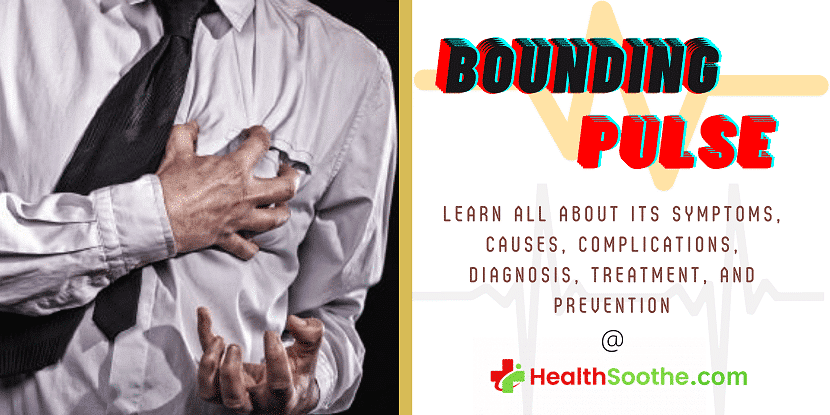A bounding pulse is when a person feels their heart beating harder or more vigorously than usual.
Quick Facts About Bounding Pulse
| A | B |
|---|---|
| Definition | A bounding pulse is an unusually strong and forceful pulse that can be felt over an artery |
| Also Known As | Heart palpitations |
| Normal Pulse Rate | 60 to 100 beats per minute |
| Characteristics | Strong and forceful pulsation; Rapid or normal rate; Easily palpable even with light pressure |
| Common Causes | Fever, anxiety, exercise, hyperthyroidism, anemia, hypertension, heart valve disorders (e.g., aortic regurgitation), circulatory overload (e.g., from fluid retention), emotional distress, caffeine, alcohol, smoking, medications, illegal substances |
| Symptoms | Awareness of the heartbeat (palpitations), rapid or irregular heartbeat, shortness of breath (in severe cases), lightheadedness, chest pain |
| Diagnosis | Physical examination (palpation of pulse), medical history, blood tests, imaging studies (e.g., echocardiography, ultrasound) |
| Potential Complications | Heart failure, stroke (if associated with atrial fibrillation), cardiovascular events (if underlying condition is severe and untreated) |
| Treatment | Addressing the underlying cause (e.g., treating hyperthyroidism, managing fever), medications (e.g., beta-blockers for hypertension), lifestyle modifications (e.g., reducing stress, avoiding stimulants) |
| When to Seek Medical Help | Persistent or unexplained bounding pulse, associated symptoms like chest pain, shortness of breath, dizziness, or fainting |
People are often worried that a bounding pulse is a sign of a heart problem. However, anxiety or panic attacks cause many cases and will resolve on their own.
People may notice their heartbeat feels stronger in their chest or when they feel for their pulse in the neck or wrist. They might also notice an irregular heartbeat or heart palpitations.
In this article, we look at the causes and symptoms of a bounding pulse. We also discuss ways that people can treat or prevent it from happening.
What Do You Mean by a Bounding Pulse?

A bounding pulse is a strong throbbing felt over one of the arteries in the body. It is due to a forceful heartbeat.1Pulse - bounding: MedlinePlus Medical Encyclopedia
Watch the video below to know about this bounding pulse:
Causes of Bounding Pulse
A bounding pulse and rapid heart rate both occur in the following conditions or events:
- Abnormal or rapid heart rhythms
- Anemia
- Anxiety
- Long-term (chronic) kidney disease
- Fever
- Heart failure
- A heart valve problem called aortic regurgitation
- Heavy exercise
- Overactive thyroid (hyperthyroidism)
- Pregnancy, because of increased fluid and blood in the body
In many cases, the cause for a bounding pulse is never found. On the other hand, when the cause is found, it is usually not severe or life-threatening. But on occasion, a bounding pulse can point to a serious health problem that requires medical attention.2https://www.healthline.com › health › bounding-pulse
How will I know if I have a Bounding Pulse?
With a bounding pulse, you may feel that your heart is beating faster than normal. You may feel your pulse in the arteries of your neck or throat. Sometimes you can even see the pulse as it moves the skin in a more forceful way.
It may also feel like your heart is beating irregularly or that it has missed a beat, or that there is an occasional extra, more forceful heartbeat.
When to Contact a Medical Professional
Most incidences of a bounding pulse come and go within a few seconds and are not a cause for concern. However, talk to your doctor as soon as possible if you have a history of heart problems, such as heart disease, and have a bounding pulse.
If you experience any of the following symptoms along with your bounding pulse, get emergency medical care immediately, as these could be signs of a serious problem, like a heart attack:
- dizziness
- confusion
- abnormal sweating
- lightheadedness
- difficulty breathing
- fainting
- tightness, pressure, or pain in your neck, jaw, arms, chest, or upper back
Call your healthcare provider if the intensity or rate of your pulse increases suddenly and does not go away. This is very important when:
- You have other symptoms along with increased pulse, such as chest pain, shortness of breath, feeling faint, or loss of consciousness.
- The change in your pulse does not go away when you rest for a few minutes.
- You already have been diagnosed with a heart problem.
- Taking your carotid pulse
What to Expect at Your Office Visit
Your provider will do a physical exam that includes checking your temperature, pulse, rate of breathing, and blood pressure. Your heart and circulation will also be checked.
Your provider will ask questions such as:
- Is this the first time you have felt a bounding pulse?
- Did it develop suddenly or gradually? Is it always present, or does it come and go?
- Does it only happen along with other symptoms, such as palpitations? What other symptoms do you have?
- Does it get better if you rest?
- Are you pregnant?
- Have you had a fever?
- Have you been very anxious or stressed?
- Do you have other heart problems, such as heart valve disease, high blood pressure, or congestive heart failure?
- Do you have kidney disease?
The following diagnostic tests may be performed:
- Blood studies (CBC or blood count), basic metabolic panel
- Chest x-ray
- ECG (electrocardiogram)
- Echocardiogram
Diagnosing and Treating Bounding Pulse
Try to keep track of when your bounding pulse occurs and what you are doing when it happens. Also, be knowledgeable of your family’s medical history. This information will help your doctor to diagnose any condition that may be causing your symptoms.
Your doctor will discuss your medical history to see if you have a personal or family history of heart problems, thyroid disease, or stress and anxiety. Your doctor will also look for a swollen thyroid gland, which is a sign of hyperthyroidism.
They may perform tests such as a chest X-ray or electrocardiogram to rule out arrhythmia. An electrocardiogram uses electrical pulses to trigger your heartbeat. This will help your doctor find irregularities in the rhythm of your heart.
Unless your bounding pulse is caused by an underlying condition such as arrhythmia or hyperthyroidism, medical treatment is usually not necessary. However, if being overweight is causing the problem, your doctor may advise you about ways to lose weight and live a healthier, more active lifestyle.
If you are found to be healthy overall, your doctor may simply recommend ways to reduce your exposure to triggers of your abnormal heartbeat,3https://www.belmarrahealth.com › Heart Health such as stress or too much caffeine.
What Can You Do to Stop Your Bounding Pulse from Returning?
If your bounding pulse is caused by a health condition such as hyperthyroidism or an arrhythmia, be sure to follow the health regimen your doctor recommends. This includes taking any medications that they have prescribed.
If you are overweight and experiencing a bounding pulse, try to find healthy ways to lose weight and get in shape. The Mayo Clinic suggests some fun, easy ways to work fitness into your schedule, such as:
- taking your dog or the neighbor’s dog for a walk
- using television time to be active by lifting weights, walking on the treadmill, or riding your exercise bike
- doing chores such as mopping the floor, scrubbing the bathtub, mowing the lawn with a push mower, raking leaves, and digging in the garden
- making fitness your family time such as riding bikes together, playing catch, walking, or running
- starting a lunchtime walking group at work
If stress and anxiety seem to be the culprit, take steps to reduce them by doing things like:
- laughing more: watch a comedy or read a funny book
- connecting with friends and family: make plans to meet for dinner or coffee
- getting outside: take a walk or ride your bike
- meditating: quiet your mind
- getting more sleep
- keeping a journal
Once your doctor has determined that you don’t have any serious underlying causes for your heart palpitations, try not to worry about them too much. Worrying about your irregular heartbeat only adds additional stress to your life.
Limiting your alcohol and caffeine consumption can also help to keep your pulse from bounding. Some herbs (such as those used in energy drinks), medications, and even tobacco smoke can act as stimulants and should be avoided.
Talk to your doctor about stimulant medications you may be on (like those used for asthma) and what your options may be for using an alternative. Do your best to avoid any potential triggers of your bounding pulse.
All right, guys, that is it for now for the bounding pulse. I hope Healthsoothe answered any questions you had concerning the bounding pulse.
Feel free to contact us at contact@healthsoothe.com if you have further questions to ask or if there’s anything you want to contribute or correct to this article. And don’t worry, Healthsoothe doesn’t bite.
You can always check our FAQs section below to know more about bounding pulse. And always remember that Healthsoothe is one of the best health sites out there that genuinely cares for you. So, anytime, you need trustworthy answers to any of your health-related questions, come straight to us, and we will solve your problem(s) for you.
Frequently Asked Questions Related to Bounding Pulse
Is Bounding Pulse Harmful?
Most incidences of a bounding pulse come and go within a few seconds and are not a cause for concern. However, talk to your doctor as soon as possible if you have a history of heart problems, such as heart disease, and have a bounding pulse.
Does Bounding Pulse Mean High Blood Pressure?
Hypertension (High blood pressure): Generally considered a condition that presents with few or no symptoms, years of having high blood pressure can lead to the eventual development of other vascular conditions that can present with bounding pulses.
Does Bounding Pulse Mean Dehydration?
Yes. For the same reason dehydration can cause low blood pressure, it can also cause heart palpitations. Palpitations are the feeling of a pounding, fast-beating or fluttering heart. When blood volume is decreased, the heart has to beat faster to try to continue to deliver oxygen to your organs.
What Deficiency Causes Bounding Pulse?
The most common electrolytes that can cause palpitations when they get low are potassium and magnesium.
Will Bounding Pulse Go Away?
A bounding pulse does not necessarily mean a person has a medical condition, and it usually goes away on its own. People who frequently experience a bounding pulse should consult a doctor, especially if the symptom is not due to anxiety.
Is Bounding Heart Rate good?
A pulse that is very firm (bounding pulse) and that lasts for more than a few minutes should be checked by your provider as well. An irregular pulse can also indicate a problem. A pulse that is hard to locate may mean blockages in the artery.
Does Heart Failure Cause a Bounding Pulse?
The heart may speed up to compensate for its failing ability to adequately pump blood throughout the body. Patients may feel a fluttering in the heart (palpitations) or a heartbeat that seems irregular or out of rhythm. This often is described as a pounding or racing sensation in the chest.
Why Does my Heart Beat so Hard While Resting?
Most of the time, they're caused by stress and anxiety, or because you've had too much caffeine, nicotine, or alcohol. They can also happen when you're pregnant. In rare cases, palpitations can be a sign of a more serious heart condition. If you have heart palpitations, see your doctor.
Additional resources and citations
- 1Pulse - bounding: MedlinePlus Medical Encyclopedia
- 2https://www.healthline.com › health › bounding-pulse
- 3

